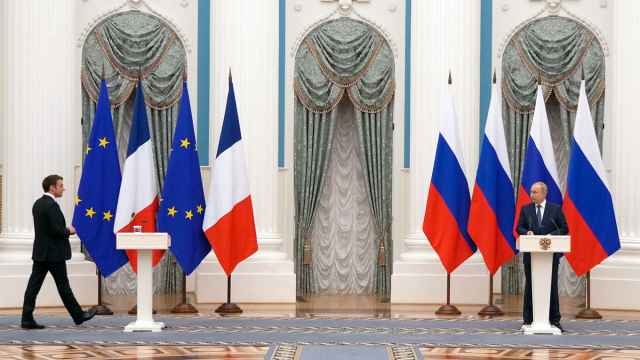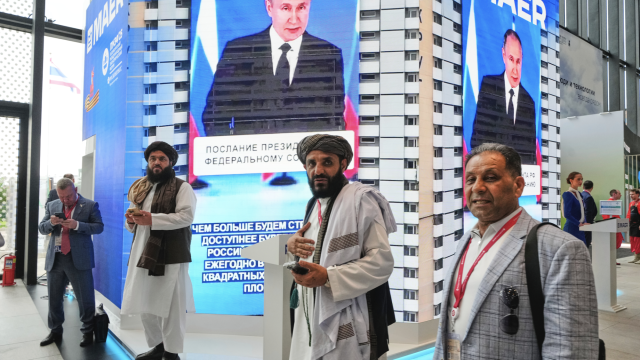The Kremlin continued its campaign of replacing regional heads in the run-up to gubernatorial elections in September with the dismissal of former Zabaikalsky region Governor Ravil Geniatulin, who has held that post for almost 20 years, and the appointment of Just Russia State Duma Deputy Konstantin Ilkovsky as acting governor.
Recall that the Kremlin worked out a method during the first gubernatorial elections, in October, to assure incumbents of victory, regardless of their popularity. But because Moscow does not have a way to replace governors through the elections themselves, the only other option is to appoint new, favored candidates far enough in advance to improve their chances of winning. This tactic was employed first in the Moscow region and then in the Dagestan and Magadan regions. This month, the term will expire for Vladimir region Governor Nikolai Vinogradov, and the same will soon happen for Ingushetia head Yunus-Bek Yevkurov and Chukotka Governor Roman Kopin. So far, Khakasia head Viktor Zimin is the only regional leader reappointed to his post as the Kremlin's favored electoral candidate.
The appointment of the first Just Russia governor appears to be a reward for the party's loyalty to the Kremlin and a means of keeping radicals out of the ranks. Now, all three Kremlin-sanctioned opposition parties have one governor each. Since Vinogradov, a Communist, will lose his office this month, the Communist Party has insisted that another party member be appointed in his place, although it might be given a different "Red Belt" region, such as Kursk. Smolensk Governor Alexei Ostrovsky represents the Liberal Democratic Party. Even the liberals have a governor, Kirov head Nikita Belykh, although his hold on power has been uncertain lately. It should be noted that all regions given to governors of the opposition parties are classified as economically depressed, including the Zabaikalsky region.
Ilkovsky, who made his career in the Sakha republic, is an outsider in Chita. He is little-known in the region but would have been considered the strongest contender had he faced Geniatulin in the election. Whereas in the past, the Kremlin deliberately sought gubernatorial candidates from outside the region they were to serve, now a search within regions often reveals a lack of strong candidates, owing to the lower level of political competition and the decline in opportunities to engage in public politics.
The appointment of Ilkovsky is more than a reward to Just Russia for its faithful service and an attempt to rally the sanctioned opposition parties around the Kremlin. It is also tweaks United Russia's nose. As recently as one week ago, the United Russia regional leadership announced that it was prepared to support Geniatulin in gubernatorial elections. But almost immediately after the president's decision was announced, the same leadership said it was willing to support the "non-party member" Ilkovsky.
Although recent actions might be interpreted as an attempt to rehabilitate the fortunes of United Russia, aka the "party of crooks and thieves," it looks as if the All-Russia People's Front will be the Kremlin's main party in the next Duma elections instead of United Russia. At the very least, efforts are now under way in all the regions to establish independent organizations for the All-Russia People's Front.
Nikolai Petrov is a professor of political science at the Higher School of Economics.
A Message from The Moscow Times:
Dear readers,
We are facing unprecedented challenges. Russia's Prosecutor General's Office has designated The Moscow Times as an "undesirable" organization, criminalizing our work and putting our staff at risk of prosecution. This follows our earlier unjust labeling as a "foreign agent."
These actions are direct attempts to silence independent journalism in Russia. The authorities claim our work "discredits the decisions of the Russian leadership." We see things differently: we strive to provide accurate, unbiased reporting on Russia.
We, the journalists of The Moscow Times, refuse to be silenced. But to continue our work, we need your help.
Your support, no matter how small, makes a world of difference. If you can, please support us monthly starting from just $2. It's quick to set up, and every contribution makes a significant impact.
By supporting The Moscow Times, you're defending open, independent journalism in the face of repression. Thank you for standing with us.
Remind me later.






